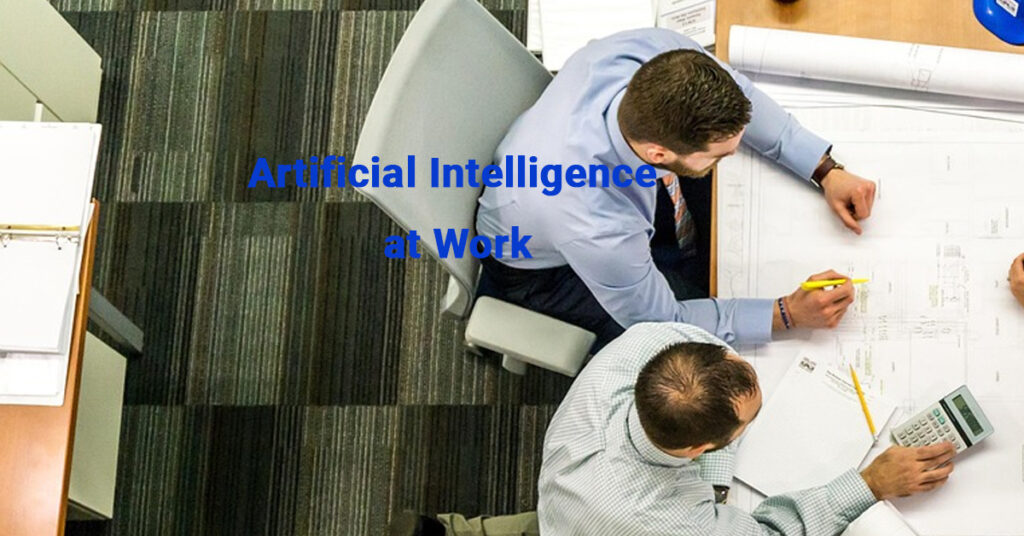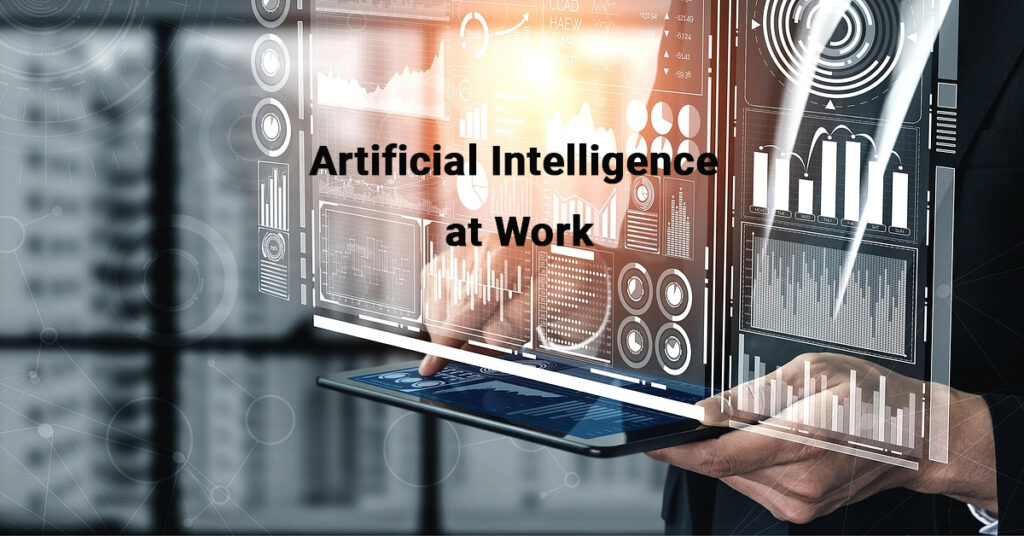How Artificial Intelligence Is Transforming the Modern Workplace

Introduction: The Rise of AI in Everyday Work
Artificial Intelligence (AI) is no longer a futuristic concept — it’s the present reality shaping how businesses operate around the world. From startups to global corporations, AI is revolutionizing the workplace by automating repetitive tasks, analyzing massive amounts of data, and providing valuable insights for smarter decision-making. Employees are no longer bogged down by routine jobs; instead, they can focus on innovation, creativity, and strategic growth.
The integration of AI in the workplace marks a new era of productivity, accuracy, and business intelligence — where human skills and machine intelligence work hand in hand.
1. Artificial Intelligence at Work: Changing the Way We Work
Artificial Intelligence at work has become a key factor in digital transformation. It’s changing not only how companies perform daily operations but also how employees interact with technology. Tools like AI-powered scheduling assistants, automated email sorting, and voice recognition systems make everyday tasks faster and more efficient.
AI algorithms can process and analyze large datasets much faster than humans ever could. This helps businesses uncover patterns, trends, and opportunities that were previously invisible. As a result, employees make smarter decisions and managers can focus on strategic business goals instead of routine administration.
In essence, AI enhances human potential — it doesn’t replace it.
2. Workplace Automation: Saving Time and Reducing Errors
Workplace automation is one of the most visible benefits of Artificial Intelligence. Automation allows organizations to perform repetitive and time-consuming tasks with high accuracy and minimal supervision. For instance, AI-powered software can automatically process invoices, schedule meetings, and even handle HR recruitment screening.
This not only saves time but also reduces human error. Employees can now dedicate their energy to problem-solving, creativity, and innovation — areas where human intelligence still leads.
Moreover, automation ensures consistency. Whether it’s customer support or logistics management, AI tools provide the same level of quality and accuracy 24/7. Businesses that adopt automation see faster service delivery and improved customer satisfaction.
3. AI Productivity Tools: Empowering Employees and Businesses
AI productivity tools are redefining what it means to “work smarter.” From project management to communication, these tools boost efficiency across all departments.
-
Chatbots help manage customer queries instantly.
-
AI meeting assistants summarize discussions and highlight key points.
-
Predictive analytics tools help companies forecast sales and manage resources effectively.
Even creative industries now rely on AI tools to design graphics, edit videos, and write content. By integrating these technologies, organizations create a balanced workflow where humans and machines complement each other.
Ultimately, AI productivity tools empower teams to achieve more in less time — driving business growth and employee satisfaction simultaneously.
4. Business AI Solutions: Smarter Decisions, Stronger Strategies
Business AI solutions are designed to solve complex challenges that were once handled through guesswork or intuition. Through machine learning and predictive analytics, companies can now make data-driven decisions backed by real-time insights.
For example:
-
Retail businesses use AI to track consumer behavior and optimize marketing campaigns.
-
Financial institutions use AI to detect fraudulent activities and predict market changes.
-
Healthcare organizations leverage AI to analyze patient data for early disease detection.
These AI solutions give businesses a competitive advantage. Decision-makers can act faster, plan better, and adapt to market trends more effectively.
When implemented correctly, AI becomes more than a tool — it becomes a strategic partner that drives innovation and sustainable growth.
5. Smart Workflow Optimization: Streamlining Operations
Smart workflow optimization is where AI truly shines. It allows companies to redesign processes for maximum efficiency. AI systems can analyze workflow bottlenecks, recommend improvements, and even predict potential delays before they occur.
For instance, AI-driven logistics systems predict delivery times, track shipments, and optimize routes automatically. In manufacturing, AI-powered sensors monitor machine performance to prevent breakdowns.
The result?
Lower operational costs, faster delivery, and better-quality products.
Smart workflow optimization ensures that every part of the organization runs smoothly — from production lines to customer service desks.
6. The Future of Work with AI: Collaboration Between Humans and Machines
The future of work with AI is not about replacement — it’s about collaboration. AI will continue to handle repetitive, data-driven tasks, while humans focus on leadership, creativity, and emotional intelligence.
Hybrid teams — a mix of human employees and AI systems — will dominate future workplaces. These teams will work together to make complex decisions, solve global problems, and innovate faster than ever.
As technology advances, skills such as critical thinking, emotional intelligence, and adaptability will become more valuable. Employees who learn to use AI effectively will thrive in this new era of digital work.
7. Machine Learning in the Workplace: The Brain Behind AI
Machine learning is the foundation of most workplace AI systems. It allows computers to learn from data, improve over time, and make accurate predictions without being explicitly programmed.
For instance:
-
HR departments use machine learning to identify the best job candidates.
-
Marketing teams use it to analyze consumer trends.
-
IT departments use it to detect cybersecurity threats in real time.
By continuously learning and evolving, machine learning helps organizations stay one step ahead in an increasingly competitive environment.
8. AI Data Analysis: Turning Information into Action
Data is the lifeblood of every organization, and AI makes it actionable. AI data analysis tools can interpret massive amounts of raw information — from sales reports to customer reviews — and turn them into clear insights.
Instead of spending days analyzing spreadsheets, businesses can instantly identify what’s working and what needs improvement. This not only saves time but also ensures faster, more informed business decisions.
In short, AI data analysis transforms information overload into strategic opportunity.

9. AI-Powered Customer Support: Always On, Always Efficient
Customer experience defines a brand’s success — and AI is redefining it. AI-powered customer support systems like chatbots, voice assistants, and predictive support platforms are now the first line of communication for many companies.
These systems provide instant responses, resolve basic issues, and route complex problems to human agents. As a result, customers enjoy faster service and consistent support around the clock.
AI also helps companies analyze customer feedback to improve services and build long-term loyalty.
Conclusion: Embracing AI for a Smarter, More Productive Future
Artificial Intelligence is no longer optional — it’s essential for any business that wants to stay relevant in a fast-changing digital world. From automation to decision-making, AI empowers companies to work smarter, faster, and more efficiently.
The future belongs to those who embrace AI as a partner in progress, not a competitor.
FAQs: Common WS Questions About AI at Work
1. What is Artificial Intelligence used for in the workplace?
AI is used for automating tasks, analyzing data, improving communication, and supporting better decision-making.
2. How does AI increase productivity at work?
AI saves time by handling repetitive tasks and providing insights that help employees focus on creative and strategic goals.
3. Will AI replace human jobs in the future?
AI will replace certain repetitive tasks, but it will also create new opportunities requiring human creativity, emotional intelligence, and problem-solving.
4. What industries benefit most from AI in the workplace?
Industries like healthcare, finance, retail, manufacturing, and customer service benefit most from AI integration.
5. How can small businesses use AI?
Small businesses can use AI tools for marketing automation, customer support, inventory management, and data analysis.
6. What skills will be important in the AI-driven workplace?
Critical thinking, creativity, adaptability, and technical literacy will be key skills for the future workforce.
7. Is AI safe and reliable for business use?
Yes, when implemented responsibly, AI systems are reliable and can enhance business performance, security, and efficiency.
